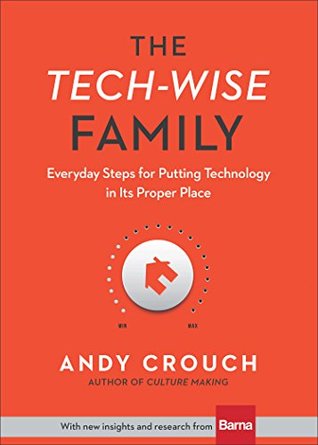More on this book
Community
Kindle Notes & Highlights
Technology is in its proper place when it helps us bond with the real people we have been given to love. It’s out of its proper place when we end up bonding with people at a distance, like celebrities, whom we will never meet. Technology is in its proper place when it starts great conversations. It’s out of its proper place when it prevents us from talking with and listening to one another. Technology is in its proper place when it helps us take care of the fragile bodies we inhabit. It’s out of its proper place when it promises to help us escape the limits and vulnerabilities of those bodies
...more
This highlight has been truncated due to consecutive passage length restrictions.
This better way involves radically recommitting ourselves to what family is about—what real life is about. Our homes aren’t meant to be just refueling stations, places where we and our devices rest briefly, top up our charge, and then go back to frantic activity. They are meant to be places where the very best of life happens. No matter what advertising says (even those beautiful, tear-jerking Apple ads), the very best of life has almost nothing to do with the devices we buy. It has a lot to do with the choices we make, choices that our devices often make more difficult.
We are continually being nudged by our devices toward a set of choices. The question is whether those choices are leading us to the life we actually want. I want a life of conversation and friendship, not distraction and entertainment; but every day, many times a day, I’m nudged in the wrong direction. One key part of the art of living faithfully with technology is setting up better nudges for ourselves.
And of course we are meant to eat, and even to feast, but only when we fast do we make real progress toward being free of our dependence on food to soothe our depression and anesthetize our anxieties.
The most powerful choices we will make in our lives are not about specific decisions but about patterns of life: the nudges and disciplines that will shape all our other choices. This is especially true with technology. Technology comes with a powerful set of nudges—the default settings of our “easy-everywhere” culture. Because technology is devoted primarily to making our lives easier, it discourages us from disciplines, especially ones that involve disentangling ourselves from technology itself.
The first and deepest is to choose character—to make the mission of our family, for children and adults alike, the cultivation of wisdom and courage.
The second is to shape space—to make choices about the place where we live that put the development of character and creativity at the heart of our home. And the third is to structure time—to build rhythms into our lives, on a daily, weekly, and annual basis, that make it possible for us to get to know one another, God, and our world in deeper and deeper ways.
If you don’t have people in your life who know you and love you in that radical way, it is very, very unlikely you will develop either wisdom or courage. You may become smart, you might even become successful, but it is very unlikely you will have a deep enough understanding of yourself and your complex calling to actually become either wise or courageous. We just are too good at deceiving ourselves and think too highly of ourselves. The people who know us best see the truth about who we are, even as they also see more clearly who we could become.
So here’s where we have to start if we are going to live as flourishing families in an age of easy everywhere: we are going to have to decide, together, that nothing is more important than becoming people of wisdom and courage. We are going to have to commit to make every major decision, and many small decisions, on the basis of these questions: Will this help me become less foolish and more wise?
So I suggest a simple, minimal pattern of Sabbath: we choose to turn our devices off not just one day every week but also one hour (or more) every day and one week (or more) every year.
Under the covers, as alerts light up the night, anxieties and fantasies are fed as often as they are allayed—for parents as much as children. And we lose out on what we were really made for: the deep rest that would make us more cognitively, emotionally, physically, and spiritually fit for the challenges the next day will bring. The lilies of the field close up their blooms at night and rest patiently for the next day, but we, cloaked in ghostly light, make tomorrow’s troubles today’s and tonight’s instead.
All addictions feed on, and are strengthened by, emptiness.
Simply, singing may be the one human activity that most perfectly combines heart, mind, soul, and strength. Almost everything else we do requires at least one of these fundamental human faculties: the heart, the seat of the emotion and the will; the mind, with which we explore and explain the world; the soul, the heart of human dignity and personhood; and strength, our bodies’ ability to bring about change in the world. But singing (and maybe only singing) combines them all.


